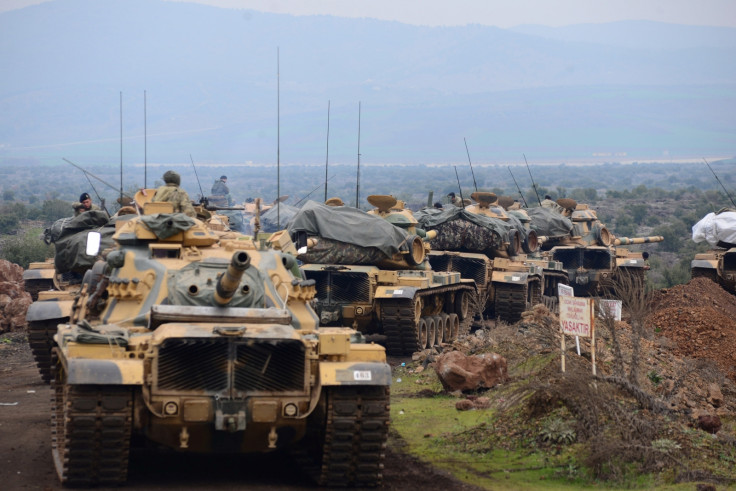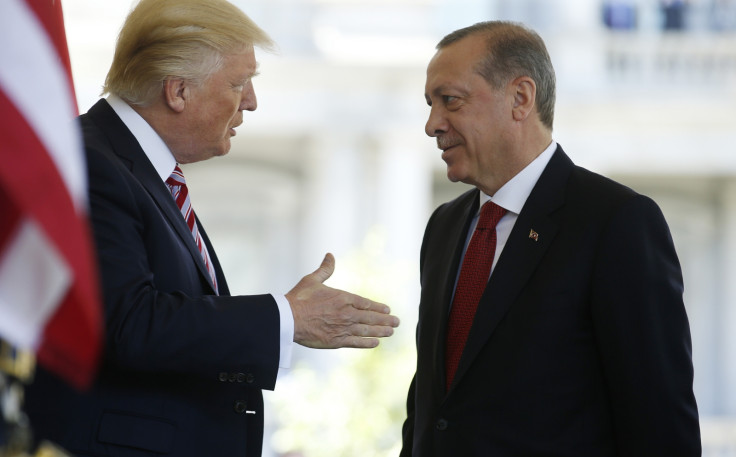Syria and Russia 'coordinating' with Turkish offensive against Kurds in Afrin
KEY POINTS
- Operation aims to remove the US-backed and Kurdish-led Syrian Democratic Forces (SDF) from Afrin region.
- SDF claims it was given an ultimatum by Syrian officials to give up the territory in the face of the Turkish assault.
- Offensive sparked by US plans to create 30,000-strong Kurdish-led border force.
Allegations of coordination between the Turkish, Syrian and Russian regimes over the offensive into the Kurdish-held Afrin region have added further pressure to an already strained relationship between Turkey and its Nato allies.
Operation Olive Branch began on 19 January, opening the newest front in a seemingly intractable conflict now almost seven years old. The goal of the operation is to create a 30km-deep buffer zone to protect Turkish towns and positions from alleged incursions and rocket attacks by Kurdish People's Protection Units (YPG) militias, which are a major part of the US-backed Syrian Democratic Forces (SDF). The SDF controls much of the north of Syria, an area which is also referred to as the Democratic Federation of Northern Syria or Rojava.
The operation was initially presented as a solely Turkish offensive, with the Syrian government condemning the aggression and threatening to shoot down Turkish warplanes. However, on 22 January, Bloomberg reported that Damascus had issued an ultimatum to the YPG forces in the region to leave their positions, or face the Turkish assault.
The report was based on an interview with Nobahar Musrafa, a representative of the foreign relations committee for the Syrian Democratic Council, the political wing of the SDF.
Musrafa said YPG representatives met with Syrian regime officials at the Russian airbase of Hmeimim on 20 January, where the Syrian official offered to take control of Afrin from the YPG in order to protect the area from the Turkish military. The offer was refused.

While Turkey has not been generally supportive of the Assad regime, it is possible that concessions have been made to allow the operation to take place. Mensur Akgün, a Turkish international relations professor, told Al Jazeera that Russia wants Assad to be included in the post-war transition period. He said that, in exchange for permission to conduct the offensive, Turkey may have agreed to avoid open criticism of Assad or possibly open up an unofficial dialogue with him.
Al Jazeera reported that on 20 January, Turkish President Recep Tayyip said Turkey had agreed with Russia that it would extend its military operation to include the SDF-held town of Manbij, approximately 30km west of the Euphrates river.
Meanwhile, the YPG General Command in Afrin released a statement on 20 January specifically blaming Russia for the Turkish offensive. The statement argued that, as Russian troops were stationed in the Afrin region, Turkey would not have been allowed to use the air space without Russian permission. "Therefore," the statement says, "we hold Russia as responsible as Turkey".
Russia's official statement on the offensive said it was concerned by the news. Some Russian troops were also withdrawn from the region, the BBC said. The US has also urged Ankara to show restraint.
The offensive was sparked by a US plan to develop a 30,000-strong SDF-led border protection force to guard against the return of Isis forces in the northern areas of Syria under SDF control. Erdogan called the force a "terrorist army", and said Turkey would take any steps necessary to ensure its security.






















